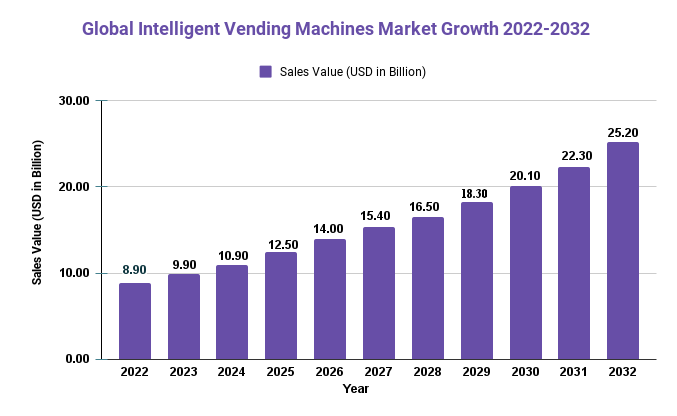Intelligent Vending Machines Market to Reach USD 25.2 Billion by 2032

Page Contents
Market Overview
Published Via 11Press: Intelligent vending machines are self-service machines that dispense products after receiving payment from customers via credit or debit card, cash, or mobile payments. They feature advanced technologies like IoT, artificial intelligence, and machine learning which enable them to provide personalized recommendations, real-time inventory tracking, and remote management. In 2022 the intelligent vending machine market was estimated to be worth USD 8.9 billion with an expected peak value of USD 25.2 billion by 2032 at a compound annual growth rate (CAGR) of 11.2% between 2022 and 2032.
Intelligent vending machines are equipped with advanced technologies like touch screens, facial recognition, and machine learning algorithms that enable them to provide personalized recommendations to customers, accept cashless payments, and monitor inventory levels in real-time. This makes them more convenient and efficient for both customers and operators. The market is being driven by the rising adoption of smart vending machines across various industries such as retail, healthcare, and transportation; hospitals are using them for dispensing medical supplies while airports supply travelers with snacks, drinks, and other travel essentials.
Overall, the intelligent vending machines market is expected to expand as more businesses utilize this technology for improved efficiency and convenience. However, challenges such as high initial costs of investment and ongoing upkeep/support could hamper growth in this space.

Key Takeaways
- The global intelligent vending machines market is projected to experience rapid growth due to rising demand for self-service machines in retail, healthcare, transportation, and other sectors.
- The rising acceptance of cashless payment methods and the growing popularity of e-commerce are driving demand for intelligent vending machines.
- Artificial intelligence, IoT, and other advanced technologies are providing vending machine operators with personalized recommendations, efficient inventory management, and improved customer experiences.
- Asia Pacific is expected to experience the fastest growth rate for intelligent vending machines due to rising urbanization and the increasing adoption of smart technologies in countries like China, Japan, and India.
Drivers, trends, and challenges have an impact on market dynamics, which can impact businesses. Request for PDF sample report
Regional Snapshot
- North America: The North American market for intelligent vending machines is the largest in the world due to the widespread adoption of cashless payment methods and the growing demand for self-service machines in retail and healthcare settings.
- Europe: The European market is forecast to experience significant growth due to the increasing adoption of vending machines in transportation and an uptick in demand for healthy and organic products.
- Asia Pacific: The Asia Pacific market is expected to experience rapid growth due to urbanization, the increasing adoption of smart technologies, and an uptick in self-service machines across retail stores, healthcare facilities, and transportation sectors.
- Rest of the World: The market in other regions of the world is expected to expand at a steady rate due to the increasing adoption of vending machines in tourism areas and increasing demand for healthy and organic products.
Drivers
- Adoption of cashless payment methods
- Growing popularity of e-commerce
- Rising demand for self-service machines in various sectors
- Adoption of advanced technologies such as IoT and AI
- Demand for personalized recommendations and real-time inventory tracking.
Restrictions
- High initial investment costs
- Limited product offerings and storage capacity
- Technical issues and security vulnerabilities
- Lack of consumer awareness about the advantages of intelligent vending machines.
Opportunities
- A rise in demand for self-service retail solutions: Intelligent vending machines provide customers with a convenient, self-serve shopping experience. With contactless transactions on the rise and an increasing need for automation within retail businesses, this market for intelligent vending machines is expected to experience substantial growth over the coming years.
- Advancements in Payment Technologies: The integration of mobile payment technologies such as NFC, QR codes, and biometric authentication has made it simpler for customers to make purchases from vending machines. This has further expanded the potential customer base for intelligent vending machines.
- Expansion of Retail Networks: Intelligent vending machines can be placed in various locations such as airports, hospitals, and universities to expand the potential customer base and market opportunities.
Challenges
- High Initial Investment: The installation and running costs of intelligent vending machines can be quite high, which could present a barrier for businesses looking to invest in this technology.
- Security Concerns: With the integration of payment technologies, there is a potential risk for fraudulence and security breaches which could pose problems for both customers and businesses alike.
- Limited Product Range: Due to the physical limitations of vending machines, businesses may experience difficulty providing customers with a diverse selection of items.
Recent Developments
- Contactless Payment Systems: With the rise in popularity of contactless payment systems, vending machine manufacturers are integrating near-field communication (NFC) technology and mobile payment solutions to offer customers a smooth payment process.
- Cloud-Based Management: Cloud-based management systems are becoming more commonplace in the vending machine market. These allow operators to remotely monitor inventory levels, track sales, and handle cashless payments – improving efficiency while decreasing operating expenses.
- Machine Learning and AI: Vending machine manufacturers are increasingly utilizing machine learning and artificial intelligence (AI) technologies to streamline inventory management and give personalized recommendations to customers. This allows vending machines to offer more tailored products while increasing customer satisfaction levels.
- Interactive Displays: Vending machines now feature interactive displays to give customers a more engaging and personalized experience. These can show nutritional info, product details, and even advertisements – making them more than just dispensers of goods.
- Sustainable Practices: With increasing consumer awareness of environmental concerns, vending machine manufacturers are adopting more sustainable practices. For instance, some firms use recycled materials in their machines and others use energy-saving technologies to reduce power consumption.
Key Market Segments
Type
- Beverages
- Snacks
- Commodity
Application
- Quick Service Restaurants
- Business Center & manufacturing facilities
- Public Transport
- School/ Institutions
- Others
Technology
- Cashless Systems
- Telemetry Systems
- Voice Recognition
Key Market Players
- Crane Co.
- Canteen Vending Services, Inc. (Compass Group USA, Inc.)
- Fuji Electric Co., Ltd.
- Royal Vendors, Inc.
- Bianchi Vending Group S.p.A.
- Intel Corporation
- Azkoyen, S.A.
- Westomatic Vending Services Ltd.
- Jofemar SA
Report Scope
| Report Attribute | Details |
| The market size value in 2022 | USD 8.9 Bn |
| Revenue forecast by 2032 | USD 25.2 Bn |
| Growth Rate | CAGR Of 11.2% |
| Regions Covered | North America, Europe, Asia Pacific, Latin America, and Middle East & Africa, and Rest of the World |
| Historical Years | 2017-2022 |
| Base Year | 2022 |
| Estimated Year | 2023 |
| Short-Term Projection Year | 2028 |
| Long-Term Projected Year | 2032 |
Frequently Asked Questions
Q: What is an intelligent vending machine?
A: An intelligent vending machine is a vending machine equipped with advanced technologies like sensors, cameras, and payment systems to provide customers with a personalized shopping experience.
Q: What products are commonly sold in intelligent vending machines?
A: Snacks, beverages, and personal care items are some of the items commonly found inside these vending machines; however, product ranges may differ based on location and intended customer base.
Q: How do customers pay at intelligent vending machines?
A: Customers can make payments to intelligent vending machines through various methods such as credit/debit cards, mobile payment technologies (NFC, QR codes), and biometric authentication (fingerprint or facial recognition).
Q: What are some of the advantages of intelligent vending machines for businesses?
A: Some advantages of using intelligent vending machines for businesses include increased revenue, reduced labor costs, and enhanced customer satisfaction due to their convenience and personalization capabilities.
Q: What security risks are associated with using intelligent vending machines?
A: Some security risks associated with intelligent vending machines include fraud and security breaches due to their integration of payment technologies, as well as theft or vandalism of the machines themselves.
The team behind market.us, marketresearch.biz, market.biz and more. Our purpose is to keep our customers ahead of the game with regard to the markets. They may fluctuate up or down, but we will help you to stay ahead of the curve in these market fluctuations. Our consistent growth and ability to deliver in-depth analyses and market insight has engaged genuine market players. They have faith in us to offer the data and information they require to make balanced and decisive marketing decisions.



